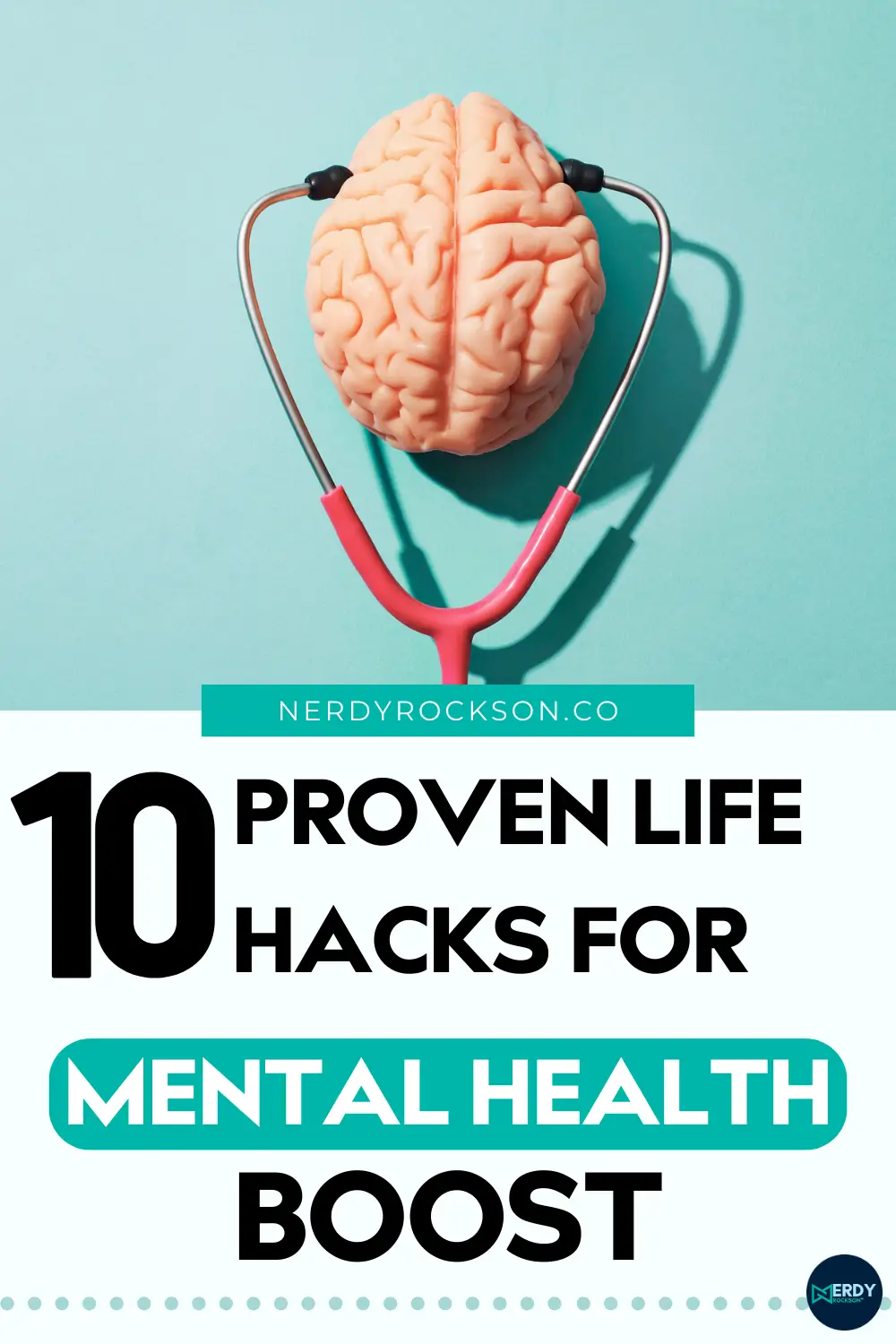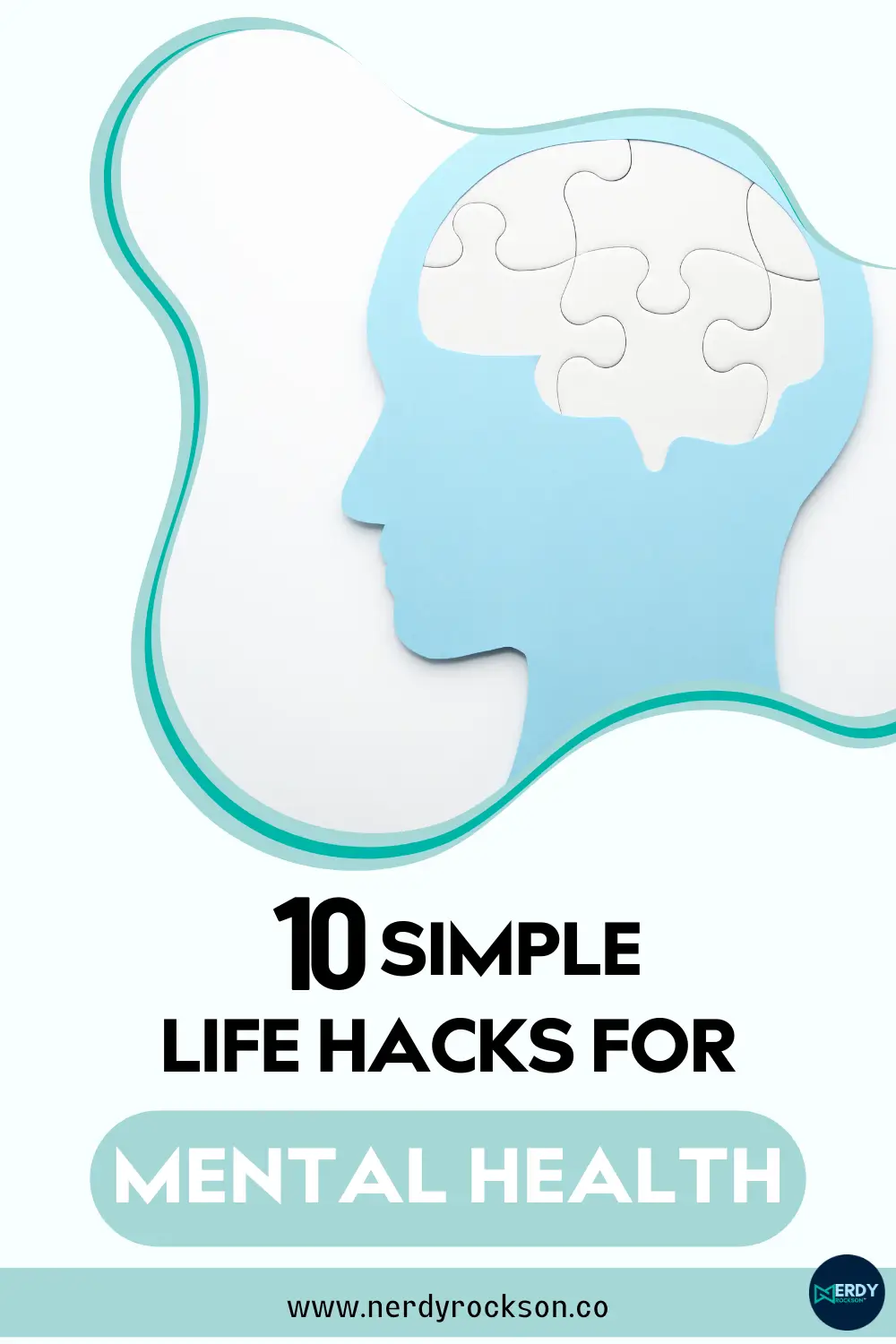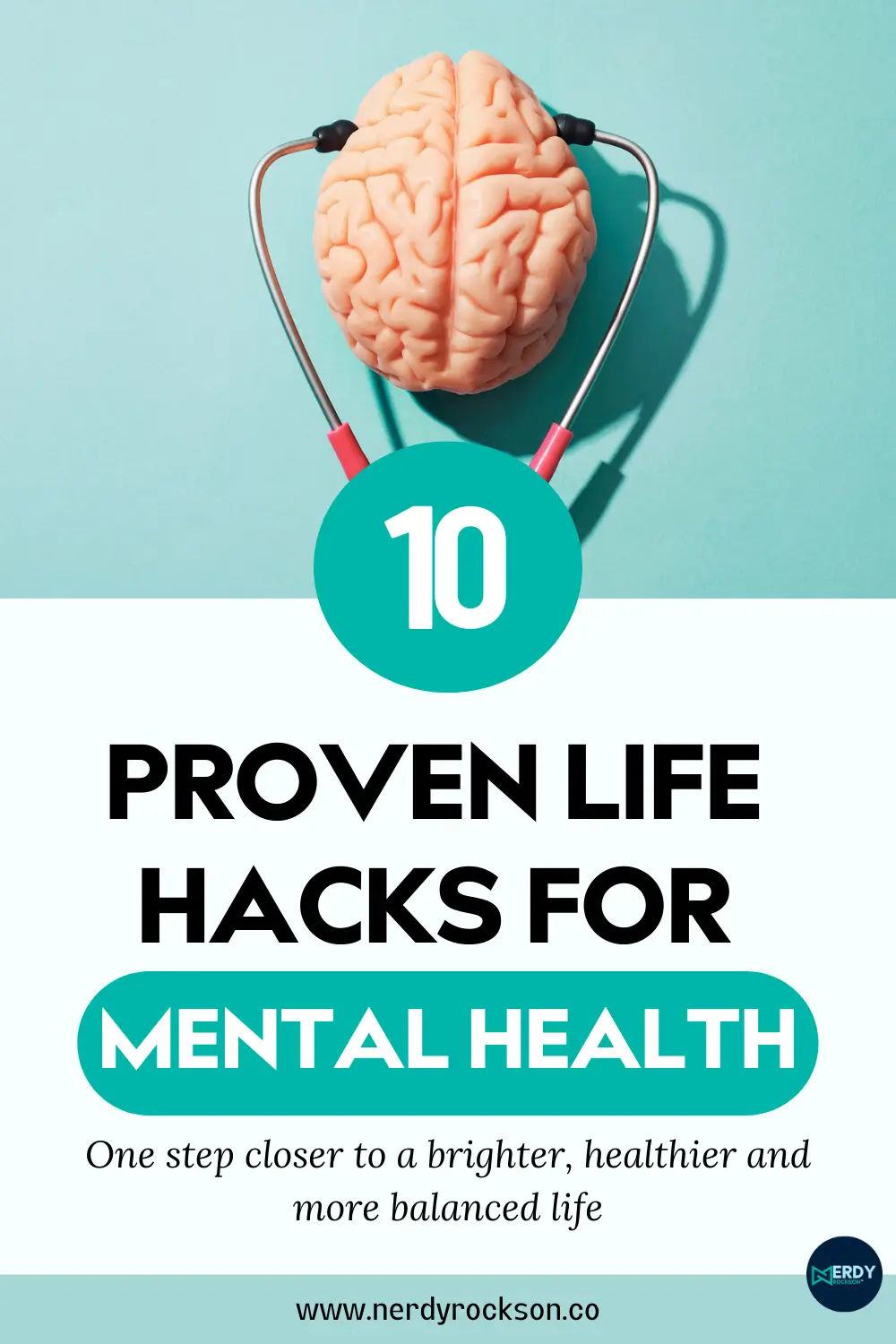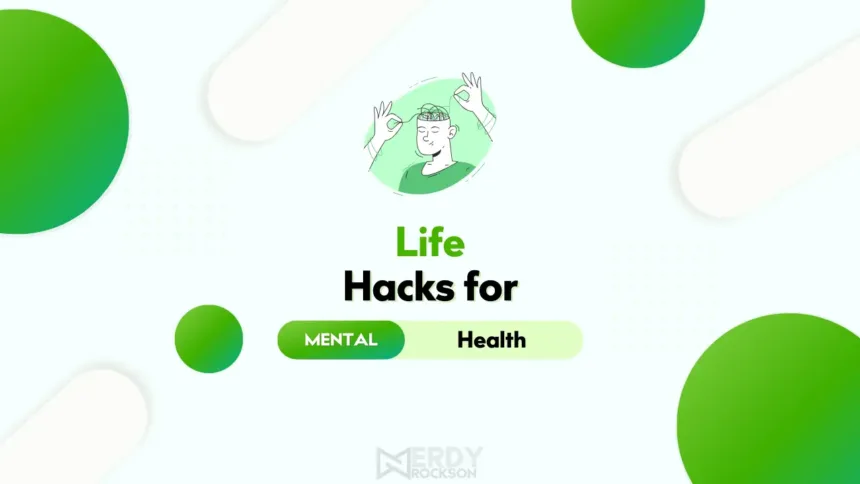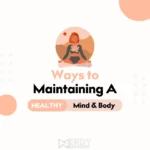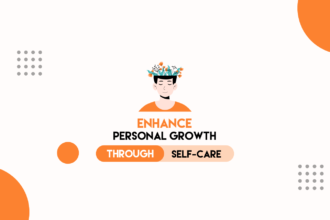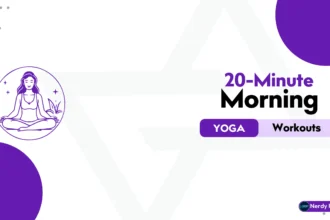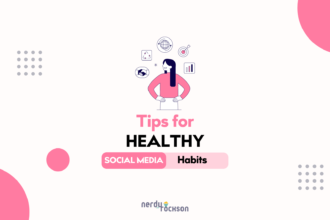The world today is increasingly aware of the importance of mental health, with a rise in discussions about the topic. However, despite the progress, there is still a lingering stigma and, more importantly, a lack of practical and approachable advice on maintaining mental well-being. This article looks at some wholesome “life hacks for mental health” that can help improve and nurture one’s mental wellness.
According to the World Health Organization, an alarming one in four people will be affected by mental or neurological disorders at some point in their lives. That’s about 2 billion of the world’s population at risk. Realizing the significance of these statistics, it becomes apparent that mental health needs our attention and conscious efforts for improvement. In response to this, we’ve compiled some life hacks for mental health dedicated to fortifying your mental robustness with ease and effectiveness.
These tips and strategies we have gathered are practical, simple, and can be incorporated into your daily routine. They don’t require massive changes but focus on small daily actions that can make a significant impact over time. Let’s take a moment to remember that improvement doesn’t happen overnight, but every little effort you make can bring you one step closer to better mental health.
Lastly, this article is no substitute for professional mental health support. It is important to seek medical help when in need. That being said, these tips enhance the quality of your mental health journey. Read on to discover how these life hacks for mental health can help you lead a brighter, healthier and more balanced life.
Be kind to yourself.
It’s all too easy to forget that self-love and kindness start from within. Self-criticism is ubiquitous, but it’s time for a change. Begin a fresh relationship with yourself by being kinder.
How you ask? The secret lies in acknowledging that it’s okay to fall short sometimes, make mistakes, or feel distressed. Treat yourself as you would a treasured friend. You wouldn’t belittle them for their imperfections, would you?
- Focussing on self-compassion rather than self-esteem is a good start.
- Positive self-talk can change the way you perceive yourself and your surroundings.
- Being alright with imperfections – Understand that nobody is perfect, and that’s perfectly fine. Embrace your flaws.
As Buddha once said, “You yourself, as much as anybody in the entire universe, deserve your love and affection.”
Being kind to yourself doesn’t mean never pushing yourself or refusing to accept responsibility for mistakes. It simply means treating yourself as a human being who is inherently fallible. When you approach your personal foibles with understanding and compassion, you not only improve your mental health but also set a solid foundation for positive change.
So remember, when the world seems to be against you, don’t join the melee.
Do activities you enjoy.
Ever noticed how time just seems to fly when you’re doing something you genuinely enjoy? That’s the power of engaging in activities you love. Not only does it make you feel good, but it’s also a natural way to reduce stress and improve your mental health. The more absorbed you are in a hobby or activity, the less space there is for negative thoughts to creep in.
This doesn’t mean you need to find something grand or extravagant to do. What matters is that you genuinely enjoy it. Some people find drawing or painting to be relaxing; others might prefer running, swimming, or other forms of physical exercise. Perhaps you relish a good book or love the challenge of a crossword puzzle or Sudoku.
Here are some tips on how to incorporate enjoyable activities into your daily routines:
- Identify what you love: Make a list of activities that you enjoy. Think back to what you loved doing as a child or things you’ve longed to try but never got around to. It might be playing an instrument, knitting, gardening, or even just taking a long walk.
- Schedule time for these activities: Once you’ve got your list, make a point to schedule time in your day, even if it’s just 15 minutes, to engage in these activities. It could be first thing in the morning, during your lunch break, or before bedtime – whatever works best for you.
- Stay Present: During the activity, make a conscious effort to really focus and immerse yourself. Try to leave behind the worries of the day and just immerse yourself in the moment. This mindfulness will enhance your enjoyment and relaxation.
Remember, loving what you do is a fantastic remedy for stress, anxiety, and other negative mental states. So set aside time to dive into your passions and hobbies – no matter how small or trivial they might seem. The goal is to stir happiness in your soul, stimulate your mind, and keep those positive vibes flowing!
Your mental health will thank you for it.
Talk to someone about how you feel.

Opening up about your feelings might seem challenging, but it’s an important step towards maintaining your mental health. You don’t have to face everything alone – sharing how you feel with someone you trust can lighten your load, and they may also provide a fresh perspective or helpful advice.
Identifying a Trusted Person
Choose someone who is supportive, empathetic, and a good listener. This could be a friend, family member, therapist, or support group. Sharing your feelings can be an intimate act, so it’s important to select someone you are comfortable with.
- Friend: A close friend who has always been there for you and who understands your situation or feelings can be a great choice.
- Family member: Families can provide a comforting and familiar environment to open up.
- Therapist: A professional who is trained and experienced can offer guidance and other therapeutic solutions.
- Support group: Sharing with people who are experiencing similar feelings or situations can provide a sense of belonging and understanding.
What to Say?
Expressing emotions isn’t always easy. Here are some tips to get you started:
- Be Honest: Open up about what you’re truly feeling. There’s no right or wrong; it’s about expressing what’s inside.
- Be Open: Don’t limit yourself. It might be painful, but sharing the complete picture can help others understand and provide more balanced support.
- Be Patient: Feelings change, and certain feelings take time to understand and process. For instance, grief might take longer to express fully.
Lastly, remember every step you take towards expressing your feelings, no matter how small, brings you closer to better mental health. It’s okay to take your time.
Find someone to share your feelings with today. It might seem difficult at first, but the relief you feel after opening up is worth it. Don’t forget talking about your emotions is a sign of strength, not weakness.
Do E.A.S.Y. things that make you feel good
Doing E.A.S.Y. things that make you feel good can be deeply refreshing and beneficial. E.A.S.Y. is an acronym suggesting that you Engage, Achieve, Savor, and Yield. But what do we mean by each letter?
Engage: Interaction with others brings joy and connection. Whether it’s a chat over coffee, a game night with friends, or just spending quality time with loved ones, these engagements can significantly uplift your mood.
Achieve: Small victories can come with a considerable boost of confidence. Setting small, achievable targets daily and completing them can enhance your sense of achievement and productivity. It could be as simple as finishing a book you’ve been meaning to read or trying a new recipe.
Savor: Learn to appreciate the moment. Whether it’s a beautiful sunrise, a delicious meal, or a relaxing bath, savouring small pleasures can provide a sense of contentment and happiness.
Yield: Recognize when you need to slow down or step back. By learning to yield, you recognize the importance of rest and recovery in maintaining mental health.
Mental health significantly impacts every aspect of your life – from your self-perception to how you deal with stress and even how you interact with others. Hence, putting your mental health first isn’t self-centric; it’s self-care.
- Take time out for things you enjoy.
- Learn a new skill or hobby.
- Go for a walk or exercise.
Remember, you don’t have to wait till you’re burnt out or overwhelmed to start caring for your mental health. Needing to unwind, relax, and refresh is a normal part of life. Cultivate habits and practices that prioritise your mental well-being.
As the saying goes, “You can’t pour from an empty cup”. Make sure your cup is full by doing E.A.S.Y. things that make you feel good.
Keep in mind small steps can lead to significant changes. So, start small, make consistent efforts, and over time, these E.A.S.Y. things will become second nature to you, aiding in maintaining sound mental health.
Spend time with your friends, not online.

While the digital world offers countless ways to connect, nothing replaces the power, fulfilment, and joy of face-to-face interactions, so whenever you can, make time for your friends in person.
Why is this crucial?
Research shows in-person social networks can act as a buffer against depression and anxiety. They pacify the brain’s fear centre, stimulate the release of feel-good hormones, and cultivate a sense of belonging. All these outcomes positively impact your mental health.
- Shared experiences: Laughter, shared meals, long walks in the park – in-person interactions pave the way for unforgettable moments and shared experiences that can lift your spirits and boost your mood.
- Quality connections: Physical presence also heightens empathy, understanding, and emotional connection, attributes that can be diluted in the digital sphere. These quality connections are indispensable for mental health.
- Immediate support: Times of trouble? Your friends are by your side, offering immediate support and empathy. Don’t underestimate this – it’s a potent stress buster and mood elevator.
How can you do this?
No matter how hectic your schedule is, there are always ways to carve out time for your friends. Here are some ideas:
- Plan weekly meals together
- Form a workout group
- Start a book club
- Volunteer or pursue a hobby together
- Simply meet for coffee and a chat
Note that spending time with friends doesn’t mean you have to plan elaborate or expensive outings. It’s the quality of connection and conversation that matters the most.
Spend some time disconnecting from your screens and reconnecting with your friends in the real world. Your brain will thank you for it. And remember: your mental health is more important than a ‘like’ on a social media post!
Keep a journal or a blog.

Keeping a journal or blog can play a surprisingly powerful role in improving your mental health. It’s a therapeutic outlet that allows you to express your thoughts and feelings, which can often be the first step towards understanding them more deeply.
Journaling is a practice that dates back to ancient civilisations, and it’s still relevant to this day due to its effectiveness. Sometimes, you just need to get your thoughts out of your head and onto paper. It’s like having a conversation with yourself where you can articulate your worries, dreams, victories, and defeats. No judgement, no advice, just plain understanding and reflection.
- Expressive journaling: Write about your deepest thoughts and feelings about the events in your life. No need to worry about being grammatically correct or cohesive; this is your safe space.
- Gratitude journaling: Focus on the good in your life. List out things you are grateful for each day. This can be a powerful tool to counter negative thoughts and focus on positivity.
- Goal-focused journaling: Write about your goals and plan steps to achieve them. This can help reduce anxiety about the future and promote positive self-talk.
Writing calms the mind, soothes the soul, and provides clarity like a bright light in a dark room.
Meanwhile, blogging takes journaling a step further. Instead of just writing for yourself, you’re putting your thoughts and experiences out there for the world to see. It’s not just therapeutic but also gives you a greater sense of purpose. You never know who might stumble across your posts and find solace, inspiration, or understanding from what you’ve written.
Following are some tips to get you started with blogging:
- Choose a topic you’re passionate about: Passion fuels creativity. This will help in sustaining your blog in the long run.
- Be authentic: Honesty connects souls. Share your own stories, experiences, and feelings to develop a profound relationship with your audience.
- Stay consistent: Consistency is the key. Try to post regularly to build up engagement and to make it a part of your self-care routine.
In summary, whether you choose journaling or blogging, the key is to make it a daily routine, allowing it to serve as a release valve for your thoughts and feelings. Remember, mental health is a journey, not a destination, and these little steps can make a big difference.
Look at the bigger picture.
It’s easy to get caught up in the minutiae of day-to-day life, forgetting to step back and look at things from a wider perspective. This is what we mean by “looking at the bigger picture.” It’s about recognizing that our minds can sometimes magnify the negatives, minimizing the positives, which can cause unnecessary stress and anxiety. Let’s explore how we can effectively utilize this approach to help improve our mental health.
Firstly, when feeling overwhelmed by a situation, take a moment to step back. Ask yourself how much this will matter in a week, a month, or a year’s time. Is the worry or stress proportional to the issue at hand? Often, our stress levels are amplified by our mind’s perception rather than the actual situation.
Next, try practicing mindfulness. Mindfulness is about focusing on the present moment, helping us to separate ourselves from our distressing thoughts or feelings. By acknowledging that these thoughts or feelings are temporary and do not define us, we create mental space and reduce their impact on our well-being.
- Focus on your breathing, noticing the rising and falling of your chest or the sensation of the air entering and leaving your body.
- Engage your senses by noticing what you can hear, feel, or taste at this very moment.
Maintain a broad focus on your life goals and values. When we dedicatedly work towards something meaningful, it can help us make sense of life’s challenges and keep us motivated. Identify your long-term goals, your purpose, and the things that bring you joy. By anchoring yourself in these values, you can develop resilience during tough times.
“The purpose of life is not to be happy—but to matter, to be productive, to be useful, to have it make some difference that you have lived at all.”
Leo Rosten
Finally, remember, it’s okay not to have all the answers right away. It is more critical to stay curious and open-minded, allowing the bigger picture to unfold at its own pace.
Learn more about mental health.

Expanding your understanding of mental health is a step towards nurturing it. Similar to physical health, mental health can be preserved, strengthened, and improved with knowledge and practice. Hence, let’s talk about how learning more about this vital aspect can improve your mental health.
Reading: One of the simplest ways to learn more about mental health is through reading. Biographies of people who’ve effectively dealt with mental health issues, self-help books, scientific journals, and mental health awareness blogs can all provide crucial insights. Reading these resources opens up new perspectives, shows various coping strategies, and fosters empathy.
Workshops and webinars: Organizations and professionals host workshops, webinars, and lectures to educate the public about mental health. Participating in these events can help you understand various mental health topics and learn practical techniques to take care of your mental well-being. They also give you an opportunity to engage in conversations and ask any queries you might have.
Awareness campaigns: Mental health awareness campaigns often focus on breaking stereotypes and misconceptions about mental illnesses while providing accurate, verifiable information. By participating in awareness campaigns, you can increase your knowledge and also contribute towards reducing the stigma associated with mental health issues.
The aim of all these endeavours is to empower you with motivation, useful strategies, and knowledge, thereby enhancing your mental health and overall well-being. Learning is a continuous process, and each new piece of information brings you a step closer to creating healthier mental habits.
Remember: When it comes to mental health, there is no health without mental health. Let’s understand more to take better care of ourselves.
Stick to a daily routine.
Adhering to a concrete daily routine fosters a sense of structure and normalcy, which is crucial for maintaining mental well-being. It aids in diminishing feelings of stress and anxiety by ensuring predictability and reducing decision fatigue.
Benefits of a Routine:
- Promotes better sleep: Consistent sleep and wake times can support a healthier sleep routine.
- Reduces procrastination and boosts productivity: Pre-planned tasks help to remain focused and committed, reducing the likelihood of procrastination.
- Nurtures healthy habits: A daily routine allows room for incorporating elements of self-care such as regular exercise, mindful eating, and ‘me’ time.
In constructing your personal routine, it’s crucial to strike a balance between work or study commitments, self-care actions, and leisure activities. By infusing the day with activities that fulfil and refresh, you can boost your mental health significantly.
| Time | Activity |
|---|---|
| 7:00 AM | Wake up and meditate |
| 8:00 AM | Healthy breakfast |
| 9:00 AM | Work or School |
| 1:00 PM | Lunch |
| 6:00 PM | Exercise |
| 7:30 PM | Dinner |
| 9:00 PM | Leisure activities (Reading/Watching TV/Socializing, etc.) |
| 10:30 PM | Prepare for bed |
| 11:00 PM | Sleep |
Remember, it’s entirely okay if your routine does not fit into this framework or if you have hiccups now and then. What matters most is discovering a routine that supports your mental health journey.
“Routine, in an intelligent man, is a sign of ambition.”
W. H. Auden
Embrace your routine as an act of self-love and resilience. It’s one of the best things you can do to fuel your mental wellbeing engine.
Ask for help
Reaching out for help is not a sign of weakness but rather a testament to your self-awareness and courage. Whether it’s a trusted friend, family member, or mental health professional, sometimes talking about what you’re experiencing can alleviate some of its weight. When you’re overwhelmed or confused, a fresh perspective or just a sympathetic listener can make a difference.
- Trusted family and friends: These are the people who know you best and care for your well-being. You don’t have to go into detail about what you’re experiencing if you don’t feel comfortable – simply let them know you’re struggling and could use some support.
- Mental health professionals: This includes psychologists, psychiatrists, therapists, and social workers. These trained experts can provide guidance, tools, and treatment methods to cope with your mental health issues. They also offer a safe space where you can express your feelings and thoughts.
- Support groups: Sharing, listening, and connecting with people who understand and are also dealing with similar struggles can be very beneficial. These groups can be found in your local community or online.
- Helplines: If you’re not ready to talk to someone face-to-face, there are numerous helplines and text services that provide immediate mental health support. This is a confidential resource and is often available 24/7.
Just remember: It’s okay to ask for help. Everyone needs support sometimes and learning how to ask for help is a worthy part of your health journey.
Paying attention to your mental health is important, but there will be times when you may need additional help. Don’t hesitate to reach out – it’s the best thing you can do for your well-being.
Toolkits
Online tools offer practical, accessible and often free methods to improve mental health. Here are some that we highly recommend:
- Headspace: An app aimed at helping people in meditation and mindfulness.
- Moodgym: An online self-help program designed to help users learn and practice skills which can prevent and manage symptoms of depression and anxiety.
- Talkspace: Connects users with a licensed therapist from over a network of thousands for daily communication.
- Calm: This app provides tools to assist with mindful living, including sleep, meditation, and relaxation.
- My Possible Self: An interactive online mental health self-help tool which helps users learn new skills to cope with stress, anxiety and depression.
Helpful mental health books.

Immersing yourself in a good book can be a great way to expand your understanding of mental health while also providing techniques and strategies for personal growth and development. Here are some beneficial mental health books:
- “Feeling Good: The New Mood Therapy” by David D. Burns. Dr. Burns uses cognitive therapy to provide effective tools and techniques to combat depression. Get a copy here.
- “The Upward Spiral” by Alex Korb. This book uses the framework of neuroscience to explain how small lifestyle changes can have a significant impact on your mood and mental health. Get a copy here.
- “Man’s Search for Meaning” by Viktor E. Frankl. Here, Frankl chronicles his experiences in a Nazi concentration camp and how one can find purpose amid suffering. Get yours here.
- “The Power of Now” by Eckhart Tolle. A guide to spiritual enlightenment, Tolle teaches readers how to live in the present moment to achieve peace. Get yours now.
- “Daring Greatly” by Brene Brown. This influential work encourages vulnerability as a source of strength and connection with others. Buy yours here.
If you find that my list of life hacks for mental health isn’t enough for you, you can get one of these books and see the wonders that books can do in improving mental health.
Conclusion
To conclude, these life hacks for mental health are not only versatile but also easily applicable to our daily routine. Implementing these practices one step at a time can significantly contribute to improving your overall mental wellness. As famously stated by renowned author Mark Twain: “The secret of getting ahead is getting started.”
Indeed, there’s something inherently empowering about taking charge of your mental health, about actively seeking those simple moments and activities that uplift us. As American novelist Kurt Vonnegut put it, “Enjoy the little things in life because one day you’ll look back and realize they were the big things.”
Remember, every effort towards achieving better mental health, however small, counts. As depicted in the Chinese proverb, “A journey of a thousand miles begins with a single step.” Let these life hacks for mental health be that step for you. In the pursuit of mental health, your endeavour matters as much as the destination. As Carl Jung beautifully articulated: “I am not what happened to me, I am what I choose to become.”
May these words encourage you to embrace these simple yet effective mental health strategies, leading you towards a more fulfilling and balanced life both mentally and emotionally.
